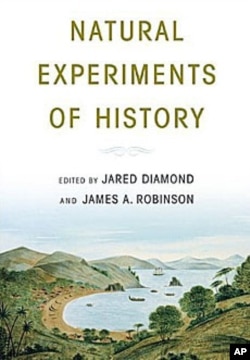Geographer Jared Diamond has traced the rise and fall of societies in his books and the social scientist recently collaborated on a book called "Natural Experiments of History," which continues to probe the question of why some societies thrive and others do not.
Diamond posed a question while he was working as a young researcher in New Guinea. He asked why its people were using stone tools when others around the world were using advanced technologies.
"And in the course of working with New Guineans, I discovered very quickly, they are really smart people," said Diamond. "They are curious, they ask questions, they understand things, they learn quickly. The fact that they were using stone tools has absolutely nothing to do with them as New Guineans. It has everything to do with the environment in which they found themselves."
Diamond pursued the theme in his 1997 Pulitzer Prize-winning book "Guns, Germs and Steel," and his later book "Collapse." He says human development is a complicated story that involves a shift from hunting and gathering, to a settled life of farming with domestication of plants and animals and establishment of centralized governments. The transformation, which occurred earlier in some places than others, allowed classes of specialist craftsmen to make advances, for example, in developing metal tools and weapons.
Diamond collaborated with Harvard University professor of government James A. Robinson in editing a new book that expands the argument, by comparing societies to see how changed conditions led to different outcomes.
One chapter looks at the impact of slavery on Africa. Diamond notes that some African countries, including Benin, Senegal, Ivory Coast and Ghana, were sources of slaves. Others, including South Africa, Botswana, Rwanda and Burundi, were not. All African nations have faced development problems, but the essay asks which countries fared better in the long run?
"It turns out that on the average, parts of Africa that were slave export centers are poorer today than parts that were not slave export centers," said Diamond. "Nathan Nunn, the author of that chapter in our book, looked at other explanations for that outcome, and he was able to rule them out and conclude: Slavery was not just immoral and vile, but it also has contributed to the poverty today of those African countries that were sources of slaves."
Another chapter in the book explains the dramatic differences between two countries that share the same island. Haiti was a prosperous French colony in the western third of the island of Hispaniola. The Dominican Republic was a poor Spanish colony that covered the eastern and central parts of the island. Their histories were very different.
Diamond notes that Haiti's slaves rebelled and in 1804, set up an independent nation that resisted interacting with outsiders. As black former slaves, Haitians also faced discrimination from their neighbors. The Dominican Republic had a turbulent history after declaring its independence in 1821. But through political maneuvers and pressure from other powers, including the United States, it remained an outward-looking country that continued to have ties to foreign nations. He says that international outlook eventually created a development gap with its neighbor.
"Haiti - which at the time of independence, was the richest colony in the world and accounted for about one-third of the foreign exchange of France - gradually got poorer and the Dominican Republic gradually got richer to the point where today, the Dominican Republic is about seven times richer than Haiti," said Diamond.
Diamond says geography, and political and economic choices played a role in the fate of the two countries. Because of topography and rain patterns, Haiti is much drier than the Dominican Republic. And Haitians relied on wood-based charcoal for fuel, a choice that led to deforestation and soil erosion. He notes that the Dominican Republic can afford imported fuels, and it remains more heavily forested and has suffered less environmental degradation.
Diamond says people can meet the challenges posed by geography. He notes that tropical countries tend to be poorer than those in temperate zones because farming is difficult in the tropics and many diseases are prevalent there. Yet, he says, some tropical nations including Malaysia, Singapore and Mauritius have invested in health and education and have successfully adapted their economies to the modern world.
He says countries with an abundance of a single commodity such as oil, tropical hardwoods or diamonds have an unbalanced economy and may succumb to corruption. They may also face secessionist strains in the part of the country that is rich in resources. But he says some nations, including Botswana, are meeting the challenge.
"Botswana is very well governed. It has diamonds, which are a curse for other countries, but Botswana has figured out how to make money from diamonds instead of getting churned up by civil wars," said Diamond.
He notes that Botswana created a sovereign wealth fund to promote development, and he says it has become a model for other African nations.
The author's works are widely cited, but he has his critics. Some say he reaches sweeping conclusions based on selected evidence, and gives too much weight to geography and climate and too little to historical accident.
The scholar invites others to examine the evidence and make corrections where they are needed. And he insists that history, just like natural science, offers lessons about how our choices lead to better, or worse, outcomes.




